
Lambeth is a district in South London, England, in the London Borough of Lambeth. Lambeth was an ancient parish in the county of Surrey. It is situated 1 mile (1.6 km) south of Charing Cross, across the river from Westminster Palace. The population of the London Borough of Lambeth was 303,086 in 2011. The area experienced some slight growth in the medieval period as part of the manor of Lambeth Palace. By the Victorian era the area had seen significant development as London expanded, with dense industrial, commercial and residential buildings located adjacent to one another. The changes brought by World War II altered much of the fabric of Lambeth. Subsequent development in the late 20th and early 21st centuries has seen an increase in the number of high-rise buildings. The area is home to the International Maritime Organization. Lambeth is home to one of the largest Portuguese-speaking communities in the UK, and Portuguese is the second most commonly spoken language in Lambeth after English.

Lambeth was a civil parish and metropolitan borough in south London, England. It was an ancient parish in the county of Surrey. The parish was included in the area of responsibility of the Metropolitan Board of Works in 1855 and became part of the County of London in 1889. The parish of Lambeth became a metropolitan borough in 1900, following the London Government Act 1899, with the parish vestry replaced by a borough council.
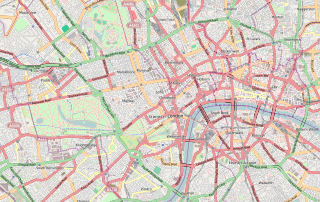
Central London is the innermost part of London, in England, spanning the City of London and several boroughs. Over time, a number of definitions have been used to define the scope of Central London for statistics, urban planning and local government. Its characteristics are understood to include a high-density built environment, high land values, an elevated daytime population and a concentration of regionally, nationally and internationally significant organisations and facilities.
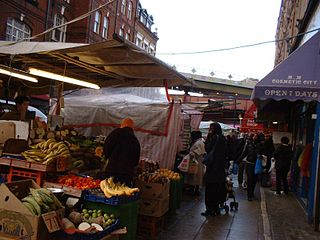
Brixton Market comprises a street market in the centre of Brixton, south London, and the adjacent covered market areas in nearby arcades Reliance Arcade, Market Row and Granville Arcade.

Evelina London Children's Hospital is a specialist NHS hospital in London, England. It is administratively a part of Guy's and St Thomas' NHS Foundation Trust and provides teaching facilities for London South Bank University and King's College London School of Medicine. Formerly housed at Guy's Hospital in Southwark, it moved to a new building alongside St Thomas' Hospital in Lambeth on 31 October 2005.

Fenchurch Street is a street in London, England, linking Aldgate at its eastern end with Lombard Street and Gracechurch Street in the west. It is a well-known thoroughfare in the City of London financial district and is the site of many corporate offices and headquarters. The name "Fenchurch" means "church in the fenny or marshy ground" and presumably refers to St Gabriel Fenchurch, which stood at the junction of Fenchurch Street and Cullum Street until it was destroyed by the Great Fire.

The Garden Museum in London is Britain's only museum of the art, history and design of gardens. The museum re-opened in 2017 after an 18-month redevelopment project.

Balcombe is a village and civil parish in the Mid Sussex District of West Sussex, England. It lies 31 miles (50 km) south of London, 16 miles (26 km) north of Brighton, and 32 miles (51 km) east-northeast of the county town of Chichester. Nearby towns include Crawley to the northwest and Haywards Heath to the south-southeast.

Westminster Bridge Road is a road in London, England. It runs on an east–west axis and passes through the boroughs of Lambeth and Southwark.
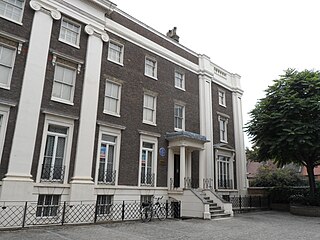
The London Fire Brigade Museum covers the history of firefighting since 1666. The museum houses old fire appliances and other equipment.

Coade stone or Lithodipyra or Lithodipra is stoneware that was often described as an artificial stone in the late 18th and early 19th centuries. It was used for moulding neoclassical statues, architectural decorations and garden ornaments of the highest quality that remain virtually weatherproof today.
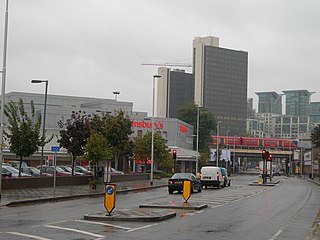
The A3036 is an A road in London, England, running from Waterloo to Wandsworth.

All Saints' Church is a Church of England parish church in West Dulwich, South London. It is a red brick building designed in a Gothic Revival style by George Fellowes Prynne and built 1888–91. It is Grade I listed.

Horseferry Road is a street in the City of Westminster in central London running between Millbank and Greycoat Place. It is perhaps best known as the site of City of Westminster Magistrates' Court. The ubiquity of the magistrates' court in newspaper crime reports means that the road name has wide recognition in the UK. Other notable institutions which are or have been located on Horseferry Road include Broadwood and Sons, the Gas Light and Coke Company, British Standards Institution, the Royal College of Veterinary Surgeons, the Burberry Group, the Environment Agency headquarters in Horseferry House, the National Probation Service, the Department for Transport at no. 33 and Channel 4. The Marsham Street Home Office building backs on to this road.

The Lincoln Memorial Tower or Lincoln Tower is a Gothic revival tower in Lambeth, London, housing small meeting rooms, that was opened in 1876 in memory of Abraham Lincoln, and paid for partly by Americans. Once part of a complex of nineteenth-century philanthropic institutions sited alongside a Congregational chapel, it is all that now remains of the original design. It is located at the corner of Westminster Bridge Road and Kennington Road close to Waterloo station and Lambeth North tube station in London, and is today a listed building associated with, and close to, Christ Church and Upton Chapel.
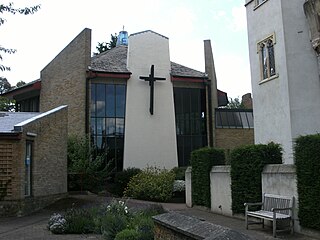
Christ Church in Gipsy Hill is an Anglican Church in the London Borough of Lambeth. The remaining part of the original Victorian church building, the tower, which is now a private dwelling is a Grade II Listed Building and occupies a prominent position, the tower being a notable landmark in the area.
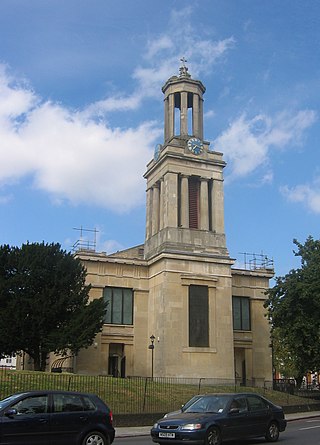
St Matthew's Church is a Church of England church in the London Borough of Lambeth. It is a Grade II* listed building which occupies a prominent position at the junction of Brixton Road, Brixton Hill and Effra Road. The church was constructed following the Church Building Act 1818 and was consecrated in 1824.

The Lambeth Workhouse was a workhouse in Lambeth, London. The original workhouse opened in 1726 in Princes Road. From 1871 to 1873, a new building was constructed in Renfrew Road, Lambeth. The building was eventually turned into a hospital. The workhouse's former master's house and chapel are now occupied by the Cinema Museum which is a grade II listed building.
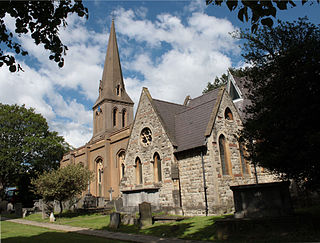
St Leonard's Church is a Church of England parish church in the London Borough of Lambeth. It is a Grade II listed building and occupies a prominent position on the west side of Streatham High Road, at its junction with Tooting Bec Gardens and Mitcham Lane.

Sky Gardens Nine Elms is a residential and retail tower in Nine Elms, within the borough of Lambeth, London. The scheme has been designed by architects Careyjones Chapmantolcher (CJCT) and developed by Fraser Property Development UK. Its construction was part of a wider regeneration of the Nine Elms area of London. The building is 120 metres (390 ft) in height.























